Sweden
despedidas
Monday was calm, I even had some time to read and just relax. Tuesday I went to Tactic to say goodbye to some friends there. Mothers who will keep on struggling for themselves and their kids, also when I'm gone. I sat down painting with some of the kids for a while, having a last real chat with their mother. When leaving their house the kids insisted to hold my hands while walking me to the main road. And then I had to leave them there with their mother... When I went to another friends job to say goodbye to her I got to meet her daughter for the first time. At a start the child was pretty shy, but when her mother told her I was the one who gave her the crayons and a book for painting she gave me a huge smile and an even bigger hug. And then I had to say goodbye to them as well...
Today, Wednesday, I've been cooking almost the whole day. But I started the day at the market in the centre to buy everything needed for a typical Swedish dinner... I also had time to join another friend to the prison here in Cobán where one of her best friends has spent his last months, waiting. He is accused for a murder on a person who some people claim is still alive... And then I had to say goodbye to them too...
The hardest part is to answer the question "But when will you come back to Guatemala again?". Today I even had to tell one friend not to ask me that question. I'm sorry, but I really don't know if I'll ever come back. Or, I know I have to, but I don't have a clue about when that will be.
When a seventeen year old girl, who almost has got no money at all, comes to you in a silent mode, asking again when you'll come back, giving you two pairs of beautiful earrings that she bought for you at the market earlier that day, showing with her whole body that she doesn't want to leave your room and then gives you the biggest hug ever before leaving, how do you react? How do you feel? What do you do? I my self can just try not to show how my stomac hurts and how badly I just want to stay with those beautiful people.
For those of you who might wonder, the dinner was great. The whole big "family" here, sixteen people, where gathered to eat meatballs, potatoes, beetroots, dark bread and strawberry cake. It was really nice, and still I'm the worst when it comes to the goodbye-and-thanks-for-everything-part.
Well tomorrow I'm off. Three days of travels until I'm back in Skåne. If I don't miss the plane at one of my transits in the States... Starting with bus to Guatemala City tomorrow. To make some more goodbyes, leaving a very caring Guatemalan family and one of my very best friends and role models here... If someone is interested in more news from Guatemala in Swedish just tell me, because this friend will stay here as a peace observer for one year and she'll send out very interesting reports every once in a while!
Well well, time to go to bed I guess... I'll be sad tomorrow and it will be a long trip back to Sweden, but at least I know I have a bunch of beautiful people awaiting me there as well. I apreciate you all so much! (And that includes all of you reading this blog, caring about my views, even if you happen to be far away from Sweden...)
Do you notice that I can't even take a proper goodbye here? Well, untill next time! Thank you. Good night.
Sunday
So, I guess I've started the real countdown for my last days here in Cobán and Guatemala. Today was my last Sunday here (at least for this year...) and I've had a great day! I've been eating cake, laughing a lot and I also had time to listen to a liveband in the shopping mall (you know the German mall looking like a big church...). Since Rosa, la ama de mi casa, and probably my best friend here, has her only day "off" (still preparing three meals...) on Sundays we had to use it well!
It somehow feels very strange to leave Guatemala again, third time leaving now not knowing if I'll ever come back. And I'm very bad at goodbyes, I prefer saying "See you again!". And I hope I will, but I can't be sure. And this time I will leave some really good friends here, friends that will never have an opportunity to visit me like I've been visiting them. But I'm so greatful for all the beautiful people that I have got to know here, and I know they've all changed me a bit, hopefully for the better ;)
Da gang! Maria, Rosa, Hector and Gudelia. All up for some cake!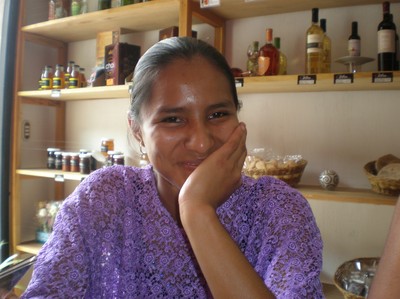
Maria, the youngest sister (out of seven).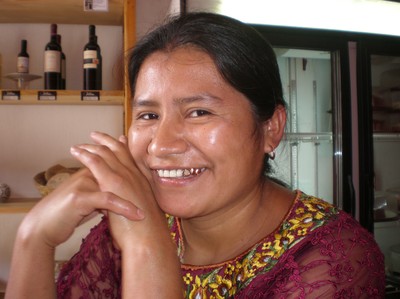
Rosa.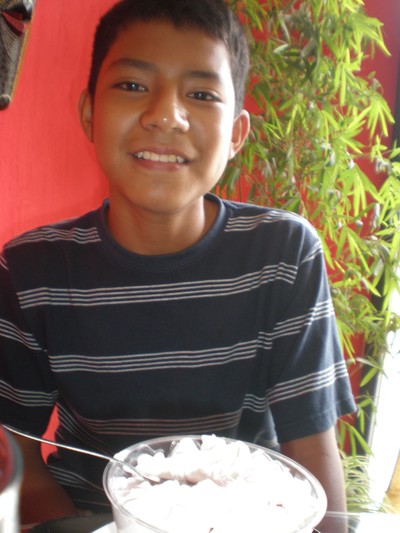
Hector, the youngest out of fourteen siblings, enjoying his "tres leches".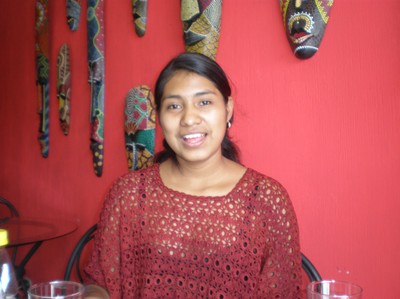
Gudelia.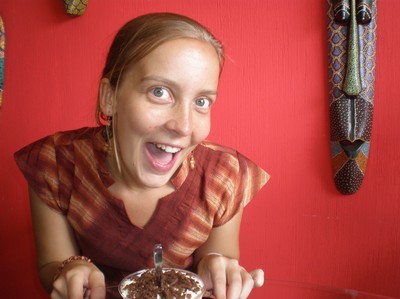
Me, about to get high on sugar...
Cake.
Querida Rosa, gonna miss you so much!
Felix, look! No hands! I know it's not heavy, but at least I'm carrying SOMETHING on my head... In Guatemala.
Lago Atitlán
Lago Atitlán, or Lake Atitlan in English, is a beautiful place in many ways. First of all it's situated on about 1500 meters above sea level and surrounded by volcanos. The history of the lake is interesting in itself since it was shaped after an volcanic eruption about 84,000 years ago. They say that the eruption was so strong it sent ashes all the way to the United States and to Panama... The lake is also surrounded by different Mayan villages, some more turistic than others, and there is a lot of culture and old traditions preserved. But, for me, Lago Atitlán is also a beutiful spot in Guatemala because of it's quietness. You can actually go here to listen to the nature, to look at the calm waters and enjoy the ravishing view of the volcanoes.
It's been great to have time for some tourism, to be able to relax, enjoy, meet friends and just to be. But at the same time it's hard. As one of my best friends said (she's now here for one year working as a peace observer): "It's hard to be a tourist here among all those people that I normally work with." Because the poverty, the inequality and most of all, our own power and powerlessness might get even more clear in a small touristic town. And all we can do is to be friendly to the people we meet. Maybe give the begger a coin or two, maybe buy a bracelet from the small Mayan woman, but we can't change the reality here and we have to learn how to live our lives in those strange parallell worlds.
But I had a great time, really did! Thanks Katta, Esteban, Lisa and Elin for joining me! It would be so nice if we could do it all over again! And now I really feel that I could start to prepare my self to go back home again. To face a new/old reality and to start processing all the things I've learned here. Just one week left now to finnish it all up!
Now, just sit back and enjoy some photos...

Lisa and Elin. On our way to the lake in the 2nd chickenbus (Elin just discovered she got robbed on the first bus, wallet and creditcard gone...)

Esteban and me, just realizing the Guatemalan busses are NOT made for tall people (I mean, taller than me...).
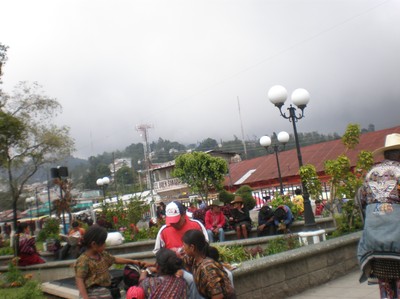
The centre of Sololá 20 minutes from the lake. You'll hopefully be able to see the beautiful pants and skirts (!) the men wear...
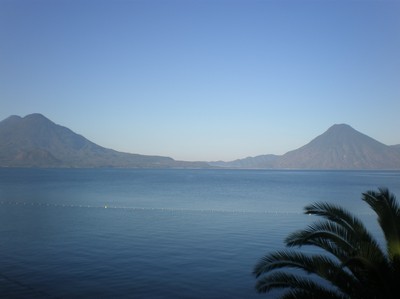
The Lake.

Colours by the lake. In a few hours there will be vendors here, trying to sell their handycraft to bypassing tourists.

Lakeview. In the early morning, before boats and turists arrive.
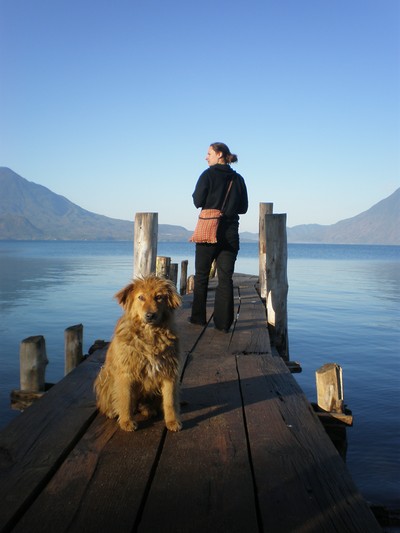
Katta and one of all street dogs enjoying the morning sun.

And so did I.
¡Se fue la luz otra vez!
It's raining again. This time very heavy. The combination of heavy rain and sheet metal roofs is making it almost impossible to have a normal conversation. The rainy season in Guatemala has started. It's been raining for almost two weeks now, a couple of hours every day, sometimes the whole day. But from the other two rainy seasons I've spent here I can't recall it to be this heavy ("fuerte" in Spanish, can't really find a good word in English, neither in Swedish...), but they say it's because of the climate changes...
"The light went away again!" is what they say when the electricity goes away. Normally it's connected to the heavy rains. I found it hard to understand the expression first, but in a country where most people don't have electric cookers and where other electronic equipment is very limited it's logical to talk about the light going away. No one here talks about electricity.
This time the light went away in the evening, just before the sunset. Soon it was all dark both inside and outside and only the frequent lightnings (and the shopping mall with the huge McDonald's M that never seems to be out of anything) gave us some light on and off. "¡Ya viene la luz!" ("The light is back!") Rosa said happily, lightening a candle in the citchen to be able to prepare the dinner.
Now the light is back again and the floor in my room reminds me of a private swimming pool. But we live in a good house. We notice the loss of electricity because we have access to it. And I notice the water leaking in to my room because I actually have good walls and windows surrounding me. A big part of Guatemala doesn't. First year when I was here, in 2005, a whole village just dissapeared in te heavy rains. It rains a lot up in the highlands and around the more volcanic parts of the country, and that's also where the poor Mayan people have their homes and grow their crops. Guess who (again) are the most exposed in this country?
But any way. I've been here for almost eight weeks now, only two and a half more to go. So it's really time for me to go on vacations, don't you think? Tomorrow I leave for a birthday party in Guatemala City, after that I'll go to some other turistic, but beautiful and interesting places, trying to stay away from flu and heavy rains. Hopefully together with some really nice people! Wish me luck!
the flu...
153 deaths so far according to the Guatemalan newspapers, seven according to WHO. Costa Rica is now the first Central American country where one case of the disease has been stated, even if it's nothing life threatening. Guatemala is trying to protect it's borders, representatives from the Central American governments get together to try to find a way to cooperate to not letting the disease spread here. In Guatemala so far there are three suspected cases, but nothing stated.
Yesterday I saw all the pictures from Mexico City where people wear masks to protect them selves. Today I saw the first people here in Cobán using the masks. In Sweden they say that the masks are doing no good, that it even can worsen the spread of the disease since it will start to itch after a while and people will use their dirty maybe infected hands to scratch them selves in their face close to mouth and nose.
Of course the situation scares me, like it should for people all over our planet, deadly diseases spread through the air is never a good thing and it's a threat to us all. But more than it scares me right now it makes me very frustrated and upset. Why? Well... Where have most of the deaths been stated so far? Why? What parts of the world will PROBABLY get most affected of this disease? Why?
Keep your hands clean is the advice given to stay away from the flu. And stay away from crowds. In a country like Guatemala or Mexico volonteers from international organisations are trying to get people to understand the importance of cleaning the hands before eating. At some places there are not even portable water. In Mexico City the population is about 22 millions. It IS crowded! And people HAVE to go to crowded areas to be able to, in different ways, earn their living for the day. Now everything is closed in Mexico City. About 35 000 restaurants and bars had to close down. How will that affect the allready poor people there?
Many contries, now also including Sweden, are advising their citizens to stay away from Mexico. I don't know what will happen with the advises if the flu will spread more down through Central America or to other parts of the world. But I know that Guatemala is allready suffering from the increasing violence here, both through the insecurity and the deaths, but also with a diminishing tourism. This affects an allready weak economy. The flu will probably help...
A friend of mine, who is now living and working in Guatemala City, told me she went to the hospital with a friend today. No flu though, but they didn't feel to good going there knowing about the poor medical security and the high risks of infection. People here who can afford it buy masks, but that's all they can do. At the hospital they told my friend there will be medicin comming in for the flu in a day or two. One dose will be about 600 quetzales, or 60 dollars. Who will be able to afford that?
I have friends here who are just making it for the day, and I'm seriuos when I say that I actually don't know how they make it to pay their rent and their food. But their worst case scenario is if they, or their kids get very sick, becuase they will probably not be able to pay for a medical control, and if they do, they might not have money to buy the medicin the doctor will recommend.
I read something interesting in a Swedish newspaper today. A representative from the Swedish National Board of Health and Security said that "Anyone in Sweden can buy the medicin against the flu to have at home. But of course it wouldn't be to nice to keep medicin for one self if one is not ill..." Sweden today says they have medication for a forth of its population, a bit over 2 million doses. In the UK they say they have about 33 million doses. In Mexico about 150 people allready died. In Sweden and UK everyone is fine so far... So what did you just say about keeping medicin at home if you are not sick?
Today the argument from the Swedish government to advise Swedes to stay away from Mexico is that if they get infected they might not get proper care and medication. I will leave Guatemala in about three weeks from now and I don't feel to worried about my self. Of cours I'll wash my hands and stay away from crowds, but I will leave for a guarded, even if it's far from safe, Europe, and while I'm still here I have a medical ensurance that will help me if I get sick, even if I know that it can't cure me.
I'm not saying I'm safe. I'm not saying anyone is safe. But I'm saying that 50 000 people die every day on our planet from other reasons than age. I was born with a lot of benefits and I can return to my country with one of the best health care supplies (free of charge as well) in the world. But in Guatemala I will leave my friends who will never see another country, who have to fight to get food for the day, who don't have the possibility to clean their hands once every hour and some of them who can not even read a newspaper since they never attended school.
So do I feel afraid? Not to much. Do I feel upset? A bit. Do I just hate the unequality in the world? You bet!
Cobán
In the town of Cobán lives about 30 000 people. 10 000 of those are under the age of 15 and only 1 500 are older than 65. Only 18 000 of those are Mayan, which is a low number for Alta Verapaz where the general numer of indigenous people are arond 720 000 out of 780 000. But you don't want this boring statistics do you? I'll try to give you some facts that are easier to handle. :)
Cobán is a pretty calm town. Not to many tourist find their way here, and if they do they mainly arrive when it's getting dark, checking in on a hostel (about 30Q or 3 dollars a night) and taking a tourist shuttle the next morning to the waterparks of Semuc Champey or up to the north jungle with the ancient Mayan pyramids of Tikal. But we actually have a handfull (or maybe not really full...) good restaurants and a lot of bakeries where you can buy yourself some white bread or maybe some white bread... That's a bit unfair though, I've actually found both doughnuts, banana bread and muffins here, but what can I say, 'borta bra men hemma bäst'! (missing daddy's homemade cinnamon rolls...)
Here is one (or maybe two) club/discotec to go to. It's open on Saturdays and that day all the cool guys from the close by villages arrive in their newly washed cars, without side mirrors and with some buckles, but with neon light underneath it and with loudspeakers screaming out the latest reggaeton songs. Well, I haven't been to tempted to go there yet...
The centre of Cobán, as in every other Guatemalan town I can recall, consists of 'the central park' surrounded by a church, the municipality and some other important institutions. There are always a lot of food vagons in the park, some beggers and all to young shoe-shine boys and nut selaesmen/-boys. We have two streets leading through the centre, both one-way-streets of course. And we have the wonderful Plaza Magdalena, the shopping centre I think I told you about before. A great mix of everything needed...
Any way, I'll stopp writing now and instead try to give you some glimpses from my temporary home town. And then I'll make Friday night with my orange juice, 4Q/half a dollar (it mostly contains from sugar, but at least I thought it would be a bit better than all the soda and other softdrinks I find here, because it says that it contains some vitamines...), my bag of butter toffees, 4,5Q, and a newly bought movie, 15Q (it's burned I know and I probably got fooled when I bought it at the market, but hey, what can a single blond girl do?!) So my luxuary Friday night will cost me about 3 dollars, which is more than most of the people here earn during a whole day of work. *Sigh* I might try to get the juice to last for two days to make me feel a bit better about my self...
Trevlig helg!

Mi casita, with Rosa always taking care of our home and house.
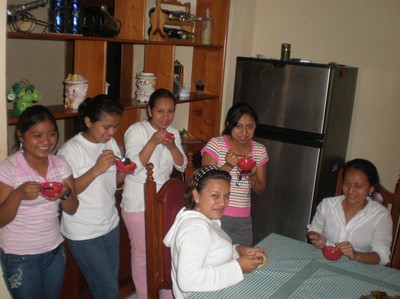
The high school girls that are lodgers here just like me come from all over the north and central parts of Guatemala.
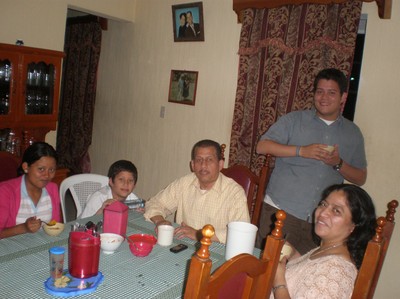
My family that I first got to know four years ago, with one brother missing in the picture...
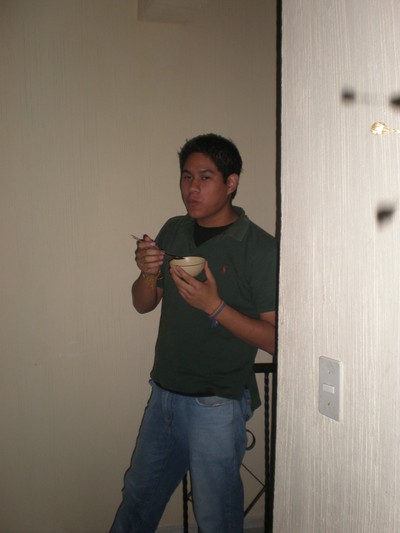
The missing brother!
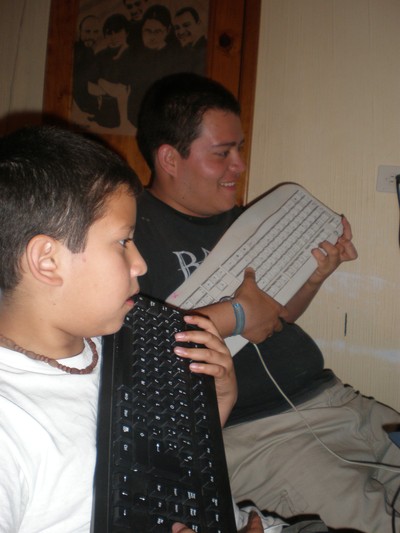
The Guitar Heroes!

Rosa with some of her sisters, three of them living with us right now. (In total we are sixteen people sharing six bedrooms, only me and the two oldest brothers having our own rooms...)
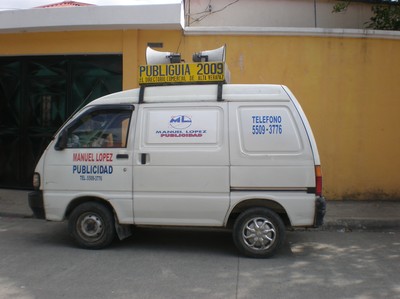
Publicity car with LOUD speakers going around in the streets.
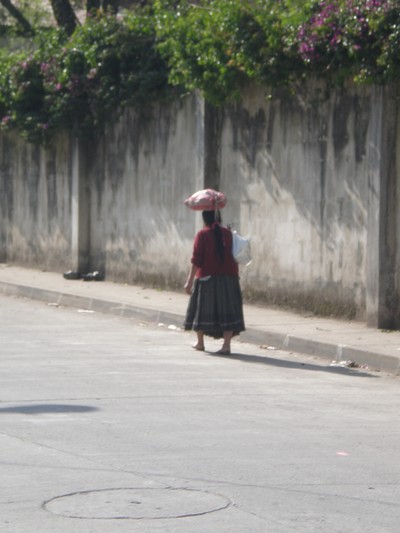
This is how we carry things here, using our heads! (I'm not to good at it yet...)

Badly taken picture since I was trying not to show my camera... But it's one of all young boys here in Cobán out on his daily work.
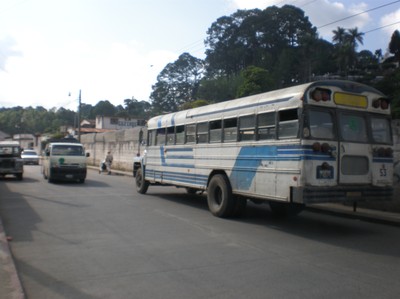
And this is how we travel, either micro or chickenbus.

"If you just put a small sign on your wall we'll give you colour for free!" Tigo is one of the biggest phone companies here and this is not the only Cobán home painted like this...
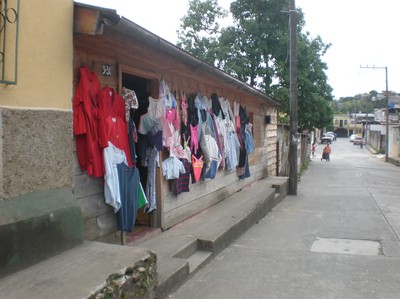
Except from the stores in the small shopping centre there are not many places where one can find first hand clothes. But if you are fine with second hand stuff, the private 'pacas' with clothes directly from the states are everywhere! I'm sure there are about fifty of them in Cobán, not kidding! And there is no organization in size or colour. But it's cheap! Best pacas sell all clothes for about 10-15Q (1-2 dollars) a piece.

Shoes anyone?

House.

Pink house, not sponsored...
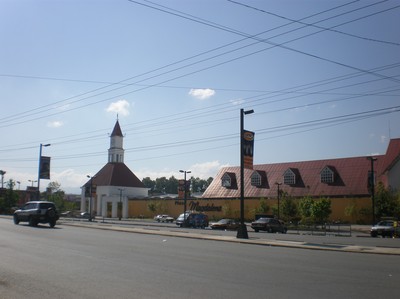
Plaza Magdalena shopping centre. The owners are according to my sources German so it's built in German style... I don't know, someone else than me thinking of a church..? At least it's next to McDonalds!

Central Park.

The Municipality.
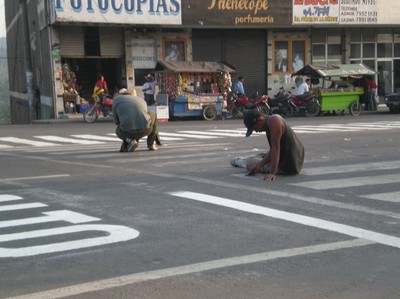
Taking away the old paint on the streets...

... to be able to re-paint it!

Fruit? Drinks? Anyone?
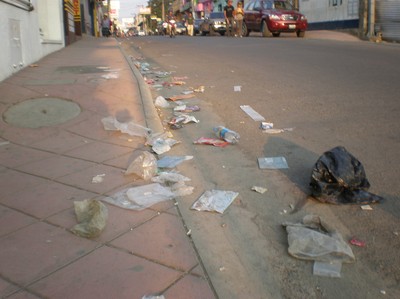
Cobán street after one of the pre-easter-processions...

Sunset.
.
the Stork...
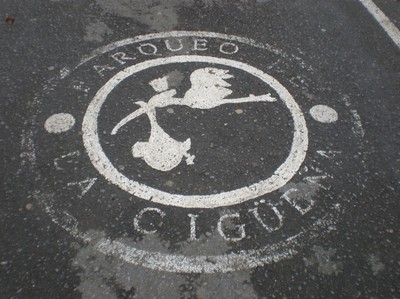
Somehow I just got so happy when I found this on the parking lot outside the mall close to where I live, and I just felt like sharing it with you. In Sweden we have normal parking lots and those marked with a man in a wheelchair, where you have to have a handicap AND a speial permit to be allowed to park. I think I recall seing some parking lots marked with a small family where obviously families (with "familiy cars" in North American SUV-size) are alloud to park. But this is definitely something new! It even says "parking for the stork". The question is just why the stork would want to park here? Is this the place he's supposed to leave the baby at? Is this where the baby get "delivered"? Help me out here!!! Makes me a bit confused, but mostly happy!
Andersson, ¿y más?
In the strange, cold country, far far away where I'm from, it's normal to have one surname. Before my parents got married my full name was Jonna My Håkansson, with the surname of my mother. But when my parents decided to marry we all changed to my fathers name, Andersson. Having the same name within the family in Sweden is a way of showing unity, that we all belong together. Some have two surnames, mostly as a way to keep their own names when they got married or maybe if one have divorced parents, correct me if I'm wrong.
Here in Guatemala, and in most latin cultures, it's almost the other way around. Here the system is made for two surnames, one from your father's side and one from your mother's. If I would have been born here, my name would have been Jonna My Andersson Håkansson, showing first my father's name and then my mother's, always in that order. It shows your heredity, it tells the people you meet about your family and your history.
But what happens if you get born by a single mother? Well, almost all children getting born in Guatemala do have a father, somewhere. Even if the parents don't live together the father can still register his name for his child so that it gets one name from each parent. But the father has got to do it. He's got to go to the municipality to register for his child, it's not enough if the mother goes there.
If the father refuses to give his name to his child, or if he simply deny that he's the father of the child (and this happens a lot here...) the mother has to start a process against him, proving that he actually is the father. This will take a lot of energy, a lot of time (bureaucracy in Guatemala is cooooomplicated stuff...) and it can get expensive.
So why would the single mother even care about getting the father to registrate his name for their child? Isn't it just easier giving the child only the mothers name?
Well... First it's about tradition and structure. The system is not made for persons with just one surname, that means the child of a single mother will get registred as her sister or brother... At least when it comes to the name. Because the child will get the same surnames as it's mother, that is first the name of it's mother's father and then the name of it's mother's mother. And in the register it will look like they're siblings. This will also make it obvious that the child doesn't have a father. In school they might just use one surname for those kids, excluding them from what's normal here. And it's not a got thing not being normal, not following the traditional structure. Being a child without father will mean a lot of disgrace and reasons for the other children to bully the fatherless child.
And of course it's also about money. Somehow it always comes down to money. By register the father's name to the child it confirms that there is a man taking responsibility for the child's life. And in a country ruled by the laws of machismo, the man is the one making money and taking care of his family. So bearing the fathers name also means that the child will be, by law, entitled to economical support by its father. Unfortunately this is a system that isn't followed to well. The mothers that I've been talking to, who actually managed to persuade the father of their child to go register their name, still doesn't get any support from the men. And in a country with 98% of all crimes being unsolved, there is a long way to justice. A long way for the fighting, single mothers and their children to get the support they're actually entitled to.
So if you ever travel in Latin America and they look strange at you when you say that you just have one surname, don't be surprised. Here it's not just a name. It's about culture, it's about pride, it's about responsibility and it's about survival. With just one surename you will probably also mess up the whole registration system!
Semana Santa
Antigua is a small, cute and very touristy city close to the capital. It's one of the few places in Guatemala where you can actually expect people to speak some English. Where you can eat international food and have a cold beer. And where you don't have to feel like you are the only white person on the planet... Antigua is also well known for it's Easter celebrations, here called 'la Semana Santa'. It's said to be the best in whole Latin America, and the second biggest in the world (after Sevilla, Spain). So do you think I went there with some expectations?! I did...
... and I didn't get disappointed. The Guatemalan easter celebrations are a beautiful mix of Catholic traditions and pre-colombian Maya traditions. The streets are filled with people during the whole week, both day and night. There are groups decorating the cobblestone streets with straw and sawdust in all colors possible. Delegations from different churches (and as you allready know there are a lot of those...) dress up in beautiful lilac dresses (black for Good Friday) and walk in long slow processions through the city, carrying Jesus, Mary and other important figures on big thrones. There is also a lot of incense and music following the processions.
For those of you who like pictures I'll give you some of that now. It's hard to get good shots though, since most of the processions are done at night when it's dark and also a bit more risky to bring the camera out in the streets. But just enjoy! And for those of you that I'll meet later on, I can show you some shorter videos...
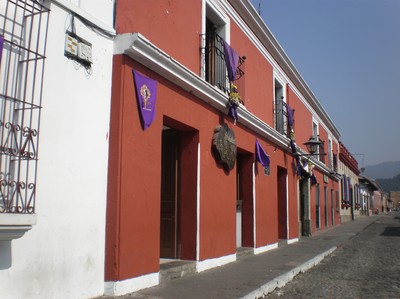
Antigua, ready for the celebrations!
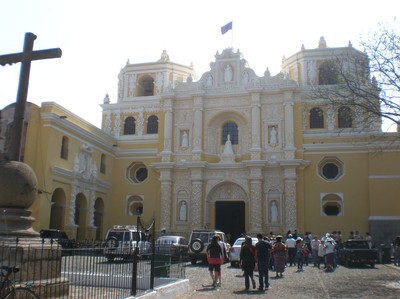
One of all the churches.
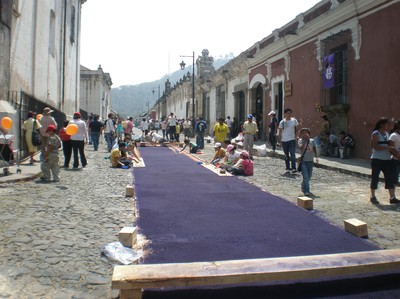
Preparing the way for the saints.
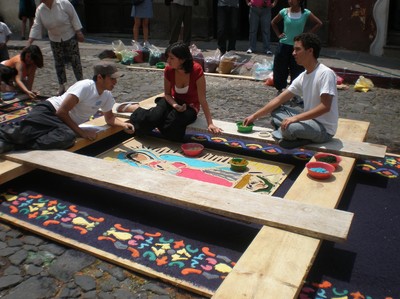
Making real art.
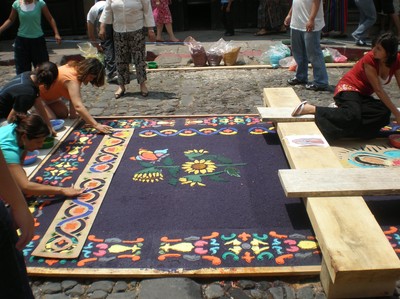
Beautiful! And just to be destroyed by another procession an hour later...

Another kind of 'alfombra'. Showing suffering through the themes 'guerra' (war), 'hambre' (hunger), 'peste' (pest, like SIDA=AIDS) and 'muerte' (death).

A lot of water and work is needed.
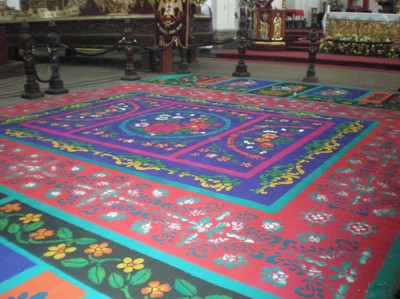
Inside the church. Well, no, it's not a carpet. It's another hand-made 'alfombra'.
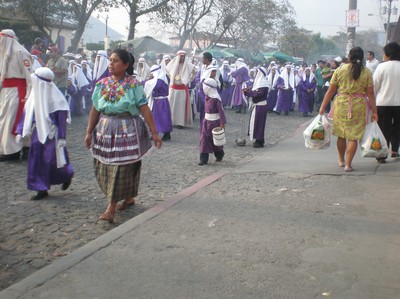
People in procession on Holy Wednesday.
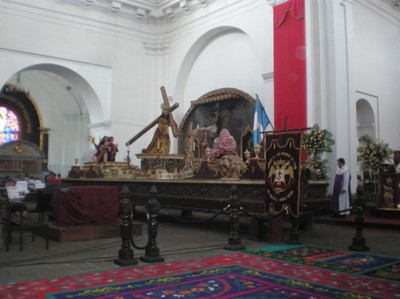
This is what they will carry around later on in the streets on Maundy Thursday.
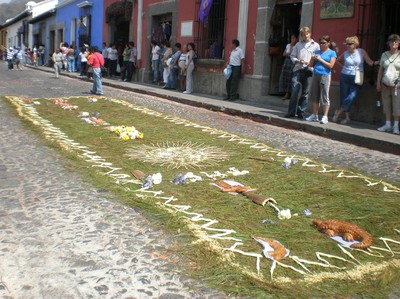
Awaiting the procession on Easter Day.
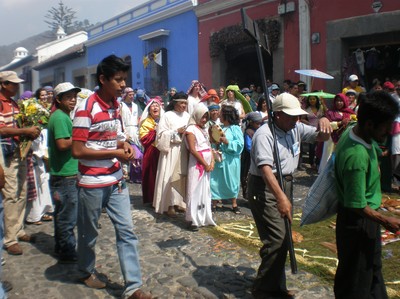
Happy people on Easter Day.
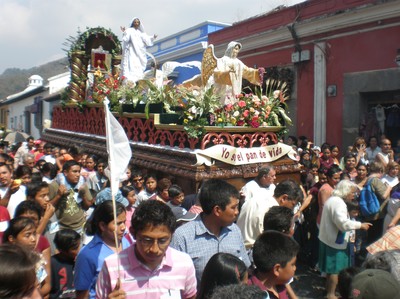
'I am the bread of life.' Hallelujah.
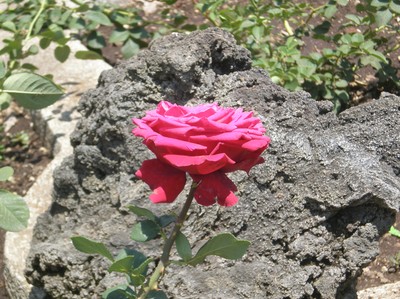
Glad Påsk!
Tactic
Today not even 45% of the urban population of Tactic learns to speak their own language Poqom'chi in their homes, instead their parents teach them Spanish so that they will be able to go to school, use public hospitals and so on. That makes a big part of the population more or less illiterate in their own language.
As in the whole of Guatemala the powerty is widespread in Tactic, but in comparison with the rest of Alta Verapaz the poverty is low here. "Only" 64,3% in Tactic are living under the poverty line and "just" 18,2% are living in extreme poverty (The medium rate of people living in extreme poverty in Alta Verapaz in total is about 41%). The standard of time spent in school for people here is about six years but 23% of the grown up population doesn't have any education at all. The main reasons for not going to school is that the children or the parents don't want to, the cost is to high and the children have to stay home working. 11% of the children aged 7 to 14 here are working.
Tactic is also the town where I'm conducting my field study. About 20% of the mothers here are singles, trying to get their small families to survive despite the machismo and the conservative society. The small town has got fourteen churches and is, as you allready know, 'en el camino del narcotráfico'.
Tactic is also a beatufil oasis where I love to go to get a break from the city of Cóban. It's surrounded by a beautiful, green landscape. The feeling in town is very tranquile and the market close to the central square is like a world of it's own.
I'm still very careful with taking pictures involving people I don't know, mostly because there are still a lot of people being suspicious towards foreigners with cameras (there have been cases where tourists get killed by this reason), but also because I think it's a part of everyones integrity to have the choice of being part of my pictures or not. Anyway, here are a few pictures showing you some chosen parts of my oasis Tactic. (You'll probably find some text as well if you just touch the pictures...)
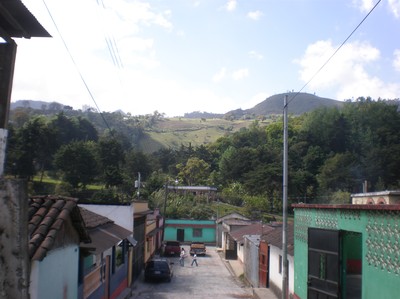
View
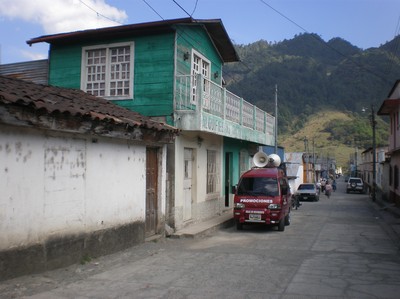
House

Street dog

Knorrrrrrrr...
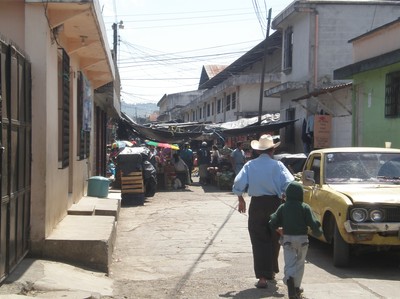
Market
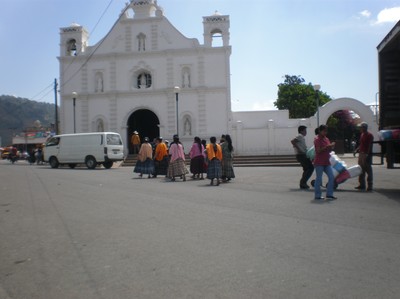
Church

Telephone
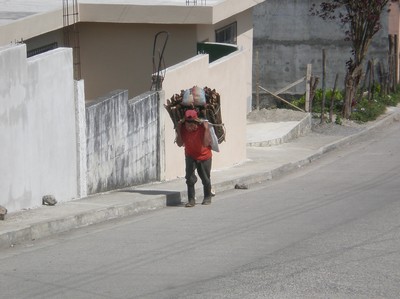
Wood
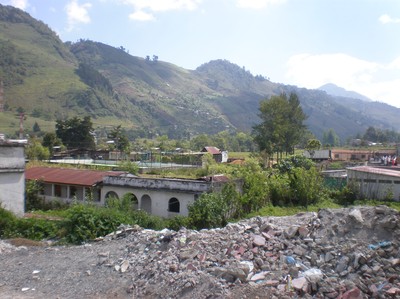
Outskirts
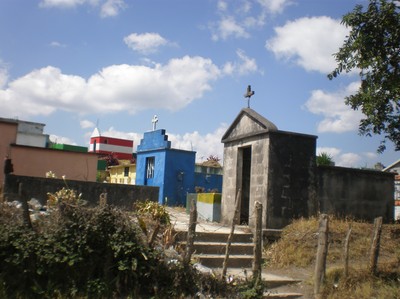
Cementary

Backyard

Kitchen

Water
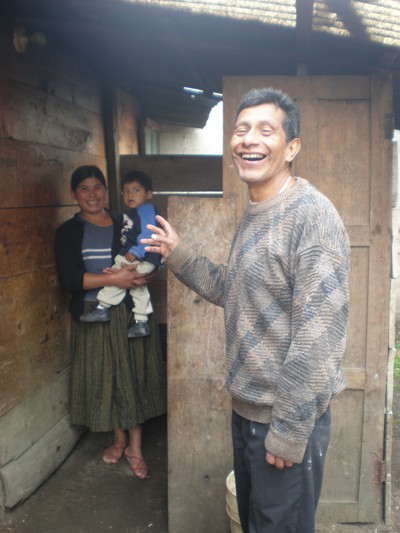
Alfonso
.
Sun
But don't worry mum, I wear long pants (With a skirt climbing over people in a crowded micro? Don't think so...), shoes (In my beloved flipflops I wouldn't be able to walk far enough.), t-shirt (Sometimes even a longsleeved shirt. Would never even think about walking around in just a top showing my shoulders though, what would people SAY?!) and my hat (Actually mostly to protect my eyes).
But now I've found my oasis. My own sundeck! Parts of the third floor in our house is an open roof. That's where I go when I need some new energy. Isn't it just amazing what a difference some sun can do? Again I'm the strange foreigner sitting in the sun when everyone else preferes to stay in the shadow. How can I ever explain to them what it is like living in a land of darkness and winter half the year? How can they ever understand what happens to the Swedes when they get some sun? This strange change of personality we notice every year when the sun starts to heaten up our could Swedish souls? How will they ever understand it here, in the land of "eternal spring"?
bananas
A couple of years ago Bill Clinton officially apologized the Guatemalan people for the suffer that his country had caused them during and after the coup d'état in the year of 1954. And this apalogy is the reason for my headline to this text. It's all about the connection between the US government, via CIA, and the United Fruit Company.
In 1944 2% of the land owners were in charge of 72% of the land in Guatemala. More than 75% of this land was not in use at that moment, while a lot of Guatemalan people were starving to death. The biggest owner of this land was United Fruit Company. They controlled both the railways and harbours in the country and 90% of all export went directly to the USA. Through not using a big part of the land, the land owners can make sure that they will get cheap labour to keep prices down. At the same time United Fruit Company didn't almost pay any taxes at all in Guatemala, they could import whatever they wanted without paying any duties AND, they had the right to kill their workers if they for example wanted to start a union.
But a coup 1944 changes all this. The people were tired of being opressed so they chose a new leader, the first democraticly chosen politician in the history of Guatemala. Through a change of political leader they also got a bit more power over their own lifes, among other things the new Guatemalan government bought all the unused land of the big companies and let the poor people lease it for their own survival. Those political changes, that helped about 100 000 families, lasted for about ten years. Those years are still talked about as the decade of democracy, the years of hope, and the best years in Guatamalan history.
But it ended abrupt in 1954 with a new coup. This time the coup that Clinton apologized for. United Fruit were loosing money, people started to find other jobs, they'd lost a lot of land and their private railway started to get concurrense by public constructed roads. What to do? They now happend to be connected to the CIA and therefore also the US government. A campaign started about Guatemala being a threat and a big Communist state. In Guatemala rumours were spread about secret actions made by the government, rumours, with a little help of weapons and money, that helped supporting the coup in 1954.
After that followed about forty years of Civil War in Guatemala. The Peace Agreements were signed in 1996. But as I said, still today about half the population live in poverty, the violence is increasing day by day and today only 2% of all the criminality is followed up with a punishment. 2%!!! And why? Because a state and a huge company didn't want to risk their monopoly and cheap labour...
In 1985 United Fruit Company changed name to Chiquita Brands International. So, is there still anyone wondering why I choose ecological and Fair Trade bananas instead of Chiquitas perfect yellow ones?
amor
http://www.youtube.com/watch?v=WX_4ZWbAq-A
machismo
There are many ways for a man to control his woman. The best way to do it is to make sure she's dependent on you. Economically. As long as you've got a job you'll just tell her to stay home, that you don't want her to work, since that would be a disgrace to you. If you really want to make sure she doesn't leave the house while you're at work just make her pregnant. Since you're the head of the house and also the one with the sexual needs (women are just there to please the man, right?) you decide when it's time to make another baby. If your woman, by any chance, would tell you that she wants to leave the house (sometimes she actually needs to go out to the market to buy you food, or go to the doctor with one of your kids), make sure she tells you when she'll get back. And if she doesn't get back on time, or if you see her talking to another man in the streets, or if she doesn't serve you food on time, or if she doesn't get the baby to stop crying or, just imagine, if she doesn't want to please you sexually whenever you fell like it, you're allowed to punish her. And then you can go home to one of your lovers (who still thinks you're divorced, waiting your second baby) to get some affection and support.
This might sound like some kind of worst case scenario and I feel like the biggest hate-all-men-feminist ever (Pablo, I promise you, I'm NOT!). But without lying to you I can tell you that this is the case for a lot of women. In Sweden those cases exsist, I'm sure. In Guatemala those are not cases, it's culture. And with saying that I DON'T mean that all men are like that. I DON'T say that this is the Guatemalan culture. But I say that this is the culture of machismo. And unfortunately the machismo is everywhere here. About one woman dies every day in Guatemala because of violence within the family. (The whole female popuation is about 7 milions.) Every second day a girl dies of violence within the family or extended family. In 80% of the cases sexual violence is included, and in 20% of those cases the girls are younger than five years old...
Guatemala is far from just violence and controlling men. The Guatemalan culture is so much more than machismo. But the violence is a part of the reality here and machismo, as bad as it gets, still is a more or less accepted part of the society. There are wonderful, caring fathers and husbands, there are organisations fighting for the women's rights. There are laws about the women's rights as well, but there is no functioning judicial system making sure that those laws are followed. If you go to the police and tell them that your husband treats you bad, probably nothing would happen. And if it did, or if you as a woman decided to leave your husband, who would take care of you then? Who would pay for your kids food, shelter and education? Maybe it's easier after all, just to do as you are told, in that way you might not end up in trouble.
yet another reality
Up in the highlands almost everyone are farmers, pretty poor and Mayan. Many of the poorest people doesn't even speak Spanish, but instead one of 23 Mayan-languages. In and around Cobán, Quek'chi is the most common language. One woman told me that in many Mayan families Spanish is considered "the language of the ladinos" (the ones with some Spanish blood in their veins...) and therefore many parents don't want their kids to learn it. Unfortunately Spanish is also the language of power here, and if you can't speak Spanish you'll get problems as soon as you want to study, needs to go to the hospital and so on.
Today I've been surrounded of the Quek'chi language. And a lot of smiling, laughing women pointing at me saying things I couldn't understand at all. I was invited to join a small group of students up to a highland-community to teach the women there how to make alternative handicrafts, so that they will be able to sell more. Well, I didn't teach anyone anything, but I was the centre of attraction (again...), that's for sure. It was a great trip, and I'll let the pictures tell you the rest. Enjoy!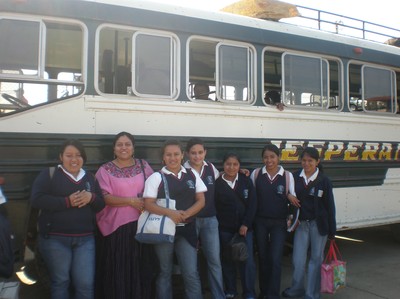
On our way. The girls with my host-mother Noelia as number two in the row...
Going up in the mountains with a pick-up-truck. Is there anything better? (Unpaved roads, wind in your hair and beautiful landscapes.)
Alegría!
Not to big roads... (that's by the way a chickenbus, the most common way of travel in Guatemala...)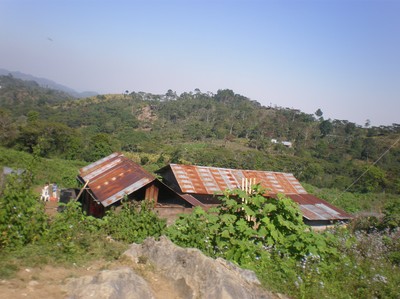
House. Home. Casa.
Cows. Vacas.
Dog. Perrrrrrrrrrro...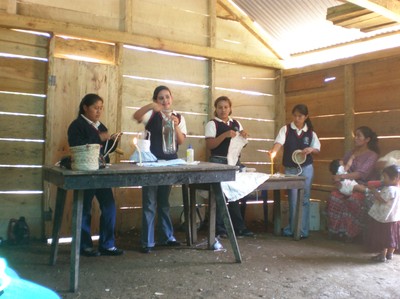
The girls explaining.
Listening carefully...
Feet. Pies (in spanish...).
(Did you notice that they all wear the same kind of plastic sandal, just in different colours? That's the cheapest sandal you can find here, that's why. When I came back to Sweden from Guatemala four years ago the same kind of plastic sandal was "THE thing" to wear, just a bit more expensive...)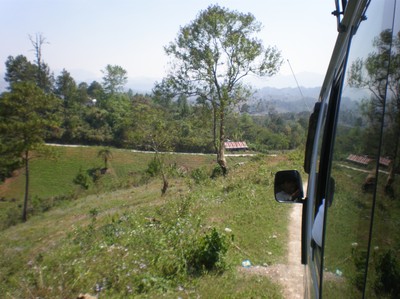
On our way home again, this time in 'micro'.
At work
Yes, I enjoy my self here in Guatemala. Yes, the sun is shining some of the days, making me drink water as never before. But other days it will be rainy and those days I'm really happy to have my dear dear hoodie. And no, it's not just lazy days, I started to do my first interviews allready last week.
A workday for me right now is:
Wake up (not to early though, I need even more sleep here than in Sweden...).
Rosa makes me breakfast (eggs, beans and tortilla with sugar-coffee, but you allready know that).
I go down to the plaza (I'll soon publish a picture, it looks like a giant church, with McDonalds just outside the entrance).
From there I take a micro (the one where the boy leans out through the window shouting: tactictactictactiiiiic, you know...), about forty minutes ride.
In Tactic I go visit Alfonso, the best spanish-teacher ever, and my guide through the Guatemalan society and culture. He's also the one introducing me to all my informants, the single-mothers.
Then I go out, to visit one or two women. I bring my pen and paper and recorder and I never know for how long I'll be there.
After the interviews I take another micro back (this time: cobancobancobaaaaaan...).
Rosa serves lunch (something with tortilla, probably pasta and some rice as you know by now)
I might have to run some errands in town trying to think about something else than my fieldwork.
Back at home I sit down by my computer to try to sum up all the new things I've got to know during my interviews.
Rosa serves dinner (well... you know what)
Some more time to work and then time to sleep.
Today I had an interview with a 28 year old woman with three kids. Yesterday I talked to a 22 year old woman who's got a four year old son. When I came home today I was almost boiling. THOSE MEN!!! I was first aiming to dedicate this text to the phenomena machismo. But no, not today. I'm still to upset to write about the way of the men. I want to be able to sleep tonight and not upset my self to much now when I just managed to calm my self down. But I'll tell you all about it. Another day.
Hopprep
Trying to give you the whole picture: I'm in Guatemala. For breakfast I eat beans, eggs and tortilla. For lunch I get pasta or rice. For dinner I eat rice, sometimes beans, and tortilla. Sometimes I get a potato as well. All those carbohydrates in combination with me sitting by the computer writing or sitting down reading (yes I actually study a lot here...) makes me feel very restless. So, go out running you might say. Well, the problem is, I'm still in Guatemala. In a city where you wouldn't want to spend to much time in the center because of all the traffic and pollution. I try not to walk to the center more than once a day either, actually because I get tired of being the centre of attraction, always having people stairing at me, shouting after me. And I allready walk faster than everyone else here, even if I'm trying to do my SLOW WALK! So how would it look like if I came running down the street? Nope.
If I was in Sweden I would go out walking or running in the woods, or maybe in a park. But I'm still in Guatemala. You just don't go where there are no people. And you don't go to the bad areas, in the outskirts of the city either. So where do I go? Well I stay in my house. Jumping. My brothers here laughed at me when I told them I bought a rope for jumping. I'm a strange one however I do. But it's gonna be nice, I like my rope. So wish me luck! ;)
(O tack Sarah, min källa till alternativt tänkande! =))
on the road
I've already been there three times this week and it's always the same feeling of reality that hits me when I get on the 'micro' (those smaller busses, normally with seats for about twelve persons) outside the big shopping mall. The radio is playing bachata, cumbia or reggaeton and sometimes a former american song, now with spanish lyrics. First time I went to Tactic this week we were twentyfour persons in the buss, plus the driver and some chicken in a fabric bag. The trip takes about forty minutes and I was half sitting, half standing in the front, holding on to the roof as good as I could so that I wouldn't cruch the small girl sitting next to me. The road is full of bends and surrounded by a beautiful green landscape with high hills and steep slopes. "Sometimes one is lucky" I think for my self when our driver makes a crazy overtaking just before a sharp bend. We pass the 24-hours hotels where the young (and older) lovers meet to keep away from their family (sometimes from mum and dad, sometimes from whife and children). We pass the men walking on the side of the road with their big piles of wood on their back. One man could afford a bike on which he now transports all the wood, trying to bike at the same time. We pass the women in their beautiful traditional skirts and huipiles (google it!), carrying children on their backs and big baskets on their heads. The young man who's been hanging out through the window shouting out his "tactictactictactiiiiiic" everytime we pass people on the road, trying to get even more people on the allready overcrowded bus, now turns to us and ask for 'el pasaje', the payment. He charges everyone, except from the poor chickens in the bag, 6 Quetzales which is about 2/3 of a US Dollar.
But it doesn't matter much that we all squeeze in, almost sitting in each others laps, in the small bus. Everyone is in the same situation and almost everyone has a friendly smile in their face showing that "I'm not dangerous, you can sit even closer if you want to". I think I will never stop being amazed about the friendliness and nice smiles I meet here. And the helpfulness and will to share. Even if there are many bad things happening in this country, even if the people here have been put through a lot of suffering the latest decades (the about thirty year long civil war ended 1996, and after that came the drugs...) most of the people still meet you, but also each other, with a lot of friendliness and respect.
Drogas
I've also been seing some old and some new friends those days and my head is a chaos of names and places and things to remember. But today I just felt I have to inform you about the worst thing happening in Guatemala right now. El narcotrafico, the huge deal with drugs getting smuggled over the boarders here.
A Guatemalan woman recently got arrested in Paris for smuggling drugs. She's a mother of two young kids and her mother here in Guatemala is desperate to get her back home frome Europe. The woman is probably treated much better in the prison in France though...
I stay in Cobán now, and I aim to visit Tactic a lot, a village situated about forty minutes south from Cobán. Both those places are on the way north through the country, on the only real road through this part. That means it's also located "en el camino de las drogas", in the way where a lot of drugtrafic now passes. The smugglers in Mexico has discovered Guatemala as a good place to land their small planes in secret, and to transport their gods across borders that are more or less unguarded. Guatemala, and especially Alta Verapaz where I stay, has become the new port for the Mexican bands to reach out to the United States and the world with their drugs. Out to the world where you are. Out to the world where the money is.
Both in Tactic and Cobán people now tell stories about neighbours being shot, about not feeling secure in the streets even during the day, about feeling insecure even in their own homes. A friend in Tactic, who usually teches spanish to tourists, tells me that she's out of work now since there are not to many tourists daring to stay here anymore. Another friend of mine told me about a man who got shot, probably because of drugs. But he didn't die but ended up in hospital instead. So the once who tried to kill him in the streets went to the hospital instead, asking for the family of the man. Of course they were all there. And so the band shot the whole family and then also the man they were aiming for in the first place. And the nurses could just watch and pray for their lifes to be saved.
According to the Swedish embassy Guatemala has become more and more insecure just during the latest six months beacuse of the rising amount of drugs going through the country. More Mexicans and foreigners show up, but also a lot of locals get involved, some volontary, some forced to leave their land to the dealers. Worst case senario is that Guatemala will be completely controlled by the Mexican druggmaffia within two years.
It might be hard, living in another reality, to understand how the drugtrade can easily destroy both people, families and a whole country. But all of you reading this are smart and educated people. You've got money. You've got knowledge. You've got power. So please, don't ever support the dirty industry of drugs!
